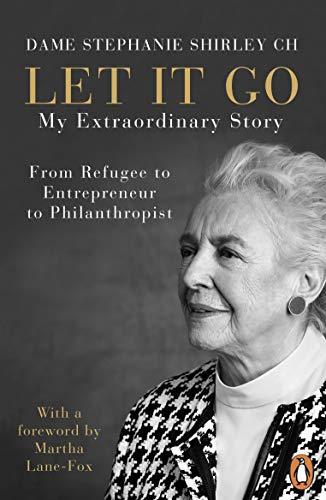What do you think?
Rate this book


A moving memoir from a woman who made a fortune in a man's world and then gave it all away...soon to be turned into a film
In 1962, Stephanie 'Steve' Shirley created a software company when the concept of software barely existed. Freelance Programmers employed women to work on complex projects such as Concorde's black box recorder from the comfort of their own home.
Shirley empowered a generation of women in technology, giving them unheard of freedom to choose their own hours and manage their own workloads. The business thrived and Shirley gradually transferred ownership to her staff, creating 70 millionaires in the process.
Let It Go explores Shirley's trail blazing career as an entrepreneur but it also charts her incredible personal story - her dramatic arrival in England as an unaccompanied Kindertransport refugee during World War Two and the tragic loss of her only child who suffered severely from Autism.
Today, Dame Stephanie Shirley is one of Britain's leading philanthropists, devoting most of her time, energy and wealth to charities that are close to her heart. In Let It Go, Shirley tells her inspirational story and explains why giving her wealth away - letting it go - has brought her infinitely more happiness and fulfilment than acquiring it in the first place.
Co-written with Richard Askwith, the former Executive Editor of The Independent and the award-winning author of seven books in his own name, including biographies of Emil Zátopek and Lata Brandisová.
'An extraordinary tale of creativity and resilience' - Guardian
'This engrossing story of an extraordinary life is filled with lessons in what it means to be human' - Financial Times
308 pages, Kindle Edition
First published October 1, 2012
Our foster parents, Guy and Ruby Smith, had no experience of child-raising and seemed to be as taken aback as we were by the gulf between our cultures.Typical of small children, she quickly learnt English, adapted and ultimately developed a fond relationship with both her foster parents whom she called Auntie and Uncle. They sounded like salt of the earth types who taught her old fashioned values such as the importance of doing one's duty.
What shocked me now was the discovery that, the more I became recognised as a serious young woman who was aiming high - whose long-term aspirations went beyond a mere subservient role - the more violently I was resented and the more implacably I was kept in my place.Shortly after getting married to a fellow researcher, she decided to pack in the chauvinistic male dominated work environment and at the age of 29 embarked on a vision of creating a small company of freelance programmers that would employ women who worked from home. Yes, dear readers, this is "working from home" decades ago, already in the 1960s...
...a large number of good-natured strangers took it upon themselves to save my life. It took me some years to digest this fact and its implications. But, once I had, a simple resolution took root deep in my heart: I had to make sure that mine was a life that had been worth saving.And then at the end:
We waste too much time being afraid, when what we should really fear is wasting time.Cannot understand why this woman isn't better known?